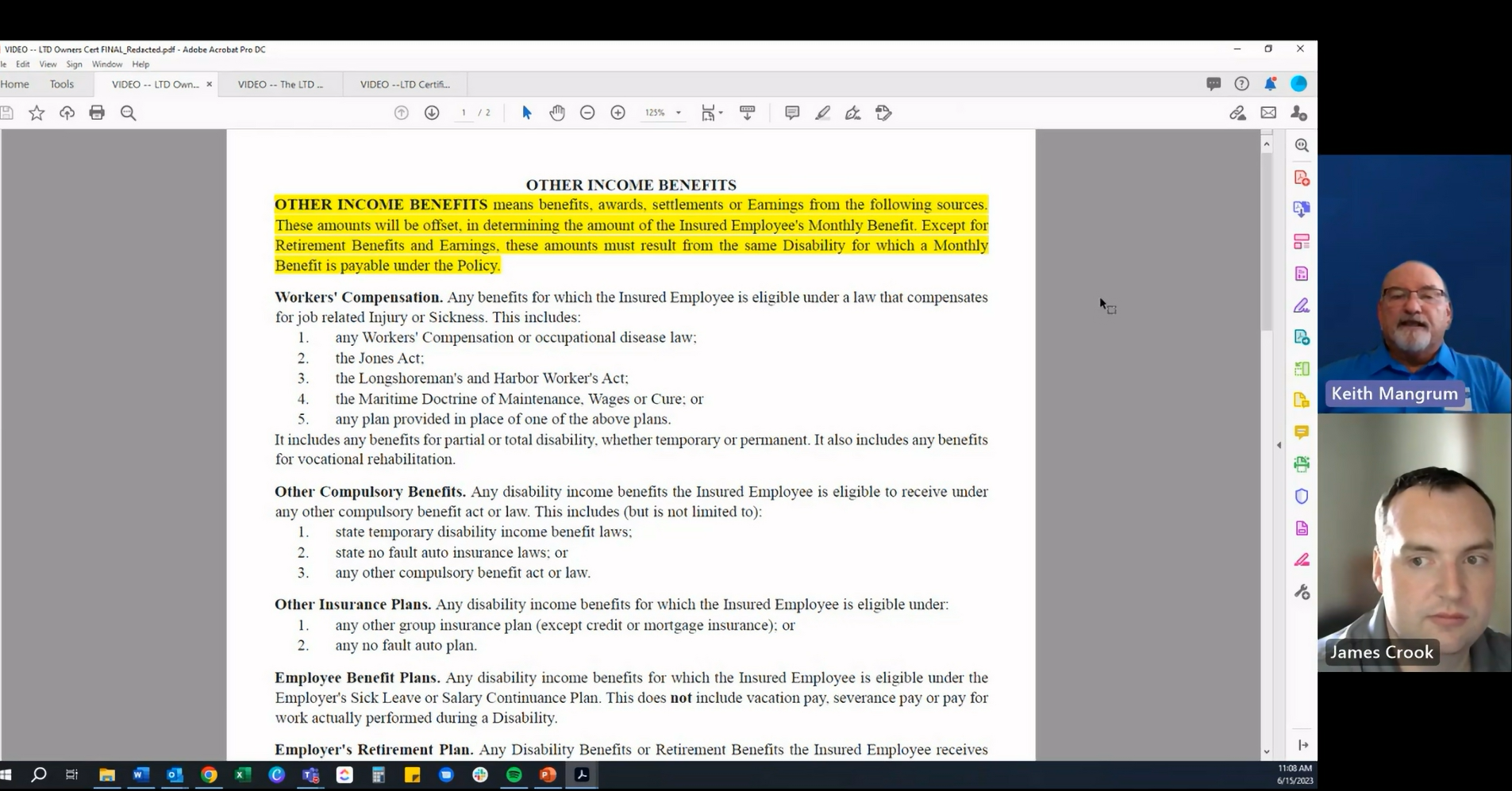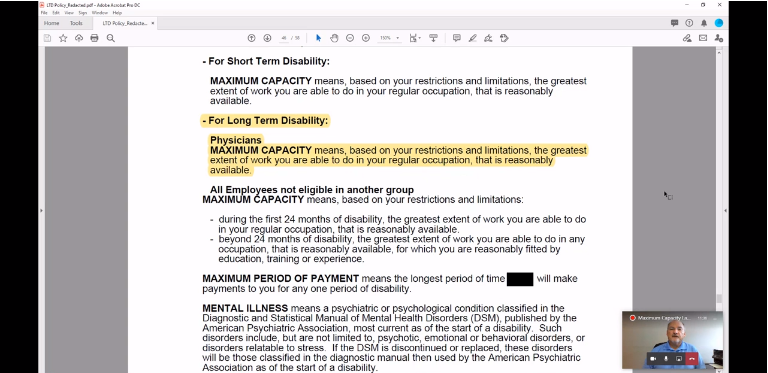Finding Contract Killers: Maximum Capacity Language
James (00:05):
All right, thanks everyone for watching. Today we’re going to produce something we’re going to call a tutorial video, we will be exploring something that is harmful to healthcare professionals in their long-term disability contracts and it’s something called maximum capacity. To help explain how that works we have Keith Mangrum with us today. Keith is the Senior Vice President of Sales at MGIS, he’s been at MGIS for 15 years and has been in the physician disability market for over 20 years. Hey, thanks for filming with us today Keith.
Keith Mangrum (00:44):
James thanks and I appreciate the opportunity and if you would, put on the screen the first page.
James (00:52):
Yeah, absolutely. So what we’re going to do is we’re going to actually do a screen share of an example of a LTD policy. A real contract but we’ve redacted everything, so Keith is going to show us how to examine an LTD contract, to find this language and what to do about it. All right, so here we go. And we’ll make sure that-
Keith Mangrum (01:17):
Okay, there you go.
James (01:18):
All right, go ahead Keith and just tell me what to do.
Keith Mangrum (01:23):
All right, you doing great. So in talking with brokers and with physicians it’s clear that they are pretty knowledgeable about the benefit that they are going to receive if they become disabled and it may even like concerned about the definition of disability to qualify for that benefit. One thing I found out is that many doctors and many brokers are not aware of how a benefit would be paid if a doctor became disabled and was partially disabled. Many times the physicians believe that their benefit will be the same as if they were helping disabled, if they claim they find that its very different and therefore its kind of a disappointment that they were not expecting. One of the reasons for this disconnect the claim time, when you have a partially disabled claimant has to do with something called maximum capacity.
Keith Mangrum (02:31):
In this particular contract you will notice that the section that talks about how much will this company pay if you’re disabled and working. It references something called disability earnings, so it says we will send you the payment if you’re disabled and monthly disability earnings if any are less than 20 percent of your index monthly earnings [inaudible 00:02:56] to the same signature entry. So basically if you’re disabled and you’re working very little and you’re earning less than 20 percent of your previous meal income they are going to send you the full benefit as if you were [inaudible 00:03:09] disabled.
Keith Mangrum (03:11):
However, the next paragraph talks about if you’re disabled and your monthly disability earning are from 20 to 80 percent, then there are some formulas that they are going to use. So now we’re talking about a situation where your disability earnings, your disabled, you can’t work fully but you’re able to work partially, you’re earning 20 to 80 percent of what you used to earn and now the question is what will your benefit be? So then it goes into an explanation of the typical 12 months returns were consented and then what happens after 12 months if you’re still partially disabled. What I would like to focus on for just a minute is the phrase or the words disability earnings then lets go to the next page and we will talk about this-
James (04:03):
Right.
Keith Mangrum (04:04):
Disability earnings. So what you want to do is you want to go to the glossary because it is highlighted, so it is in the glossary and it will tell you what disability earnings is, you would pay, it would be the income that you’re earning while you’re disabled that’s pretty typical of what you would expect that definition to be but in fact what it says is disability earnings means the earnings which you receive while you’re disabled , which is in working [inaudible 00:04:33] just that plus the earning you could receive if you were working to your maximum capacity. So now what’s happened is the [inaudible 00:04:44] introduced something that’s not really objective meaning you’re actually making the money something that’s subjective means it’s what you could receive if you were working to your maximum capacity, so let’s take a look at what maximum capacity is defined as. It’s there on the next page.
James (05:08):
Here it is.
Keith Mangrum (05:10):
And we highlighted for positions this is also true for other employees as well but specially for positions were it says maximum capacity means, based on your restrictions and limitations the greatest [inaudible 00:05:23] of work you were able to do in your [inaudible 00:05:26] that is reasonably available. So what saying is that when they determine which your benefit is going to be is you’re partially disabled say you’re disabled and you’re able to do some work, they will not only look at what you actually are earning from the work that you are doing but what you could earn if you were working as much as you possibly could in your regular occupation.
Keith Mangrum (05:53):
So let me give an example of were that maybe a disconnect with that position it claims not. [crosstalk 00:05:59] Surgeon and a surgeon has [inaudible 00:06:04] one obviously to do surgery whatever type that they do, but secondly to consult with patients and they consult with other doctors about their patients to determine what surgery needs to be done. So let’s say that I am the surgeon who becomes disabled I have a tremor in my hand, I am not able to do the type of surgery that I used to be able to do but I could still see patients and still sit in an office and still consult with doctors and other patients and that was part of my job before.
Keith Mangrum (06:41):
What this carrier can do is they can say, you have the capability to work and do some of the things you used to do, so you need to do that. And we’re going to… They should benefit not on what you actually are making but what you could be doing or how much you could be earning if you were working to your maximum capacity so theoretically you could sit at a desk for eight hours a day and talk to patients or talk to other doctors about their patients and that would be working to your maximum capacity and whether you want to do it or not they can require you to do that and if you refuse to do it they should benefit on what you could be earning if you did do it. So really what it is, is a very subjective approach to claim and it takes the choice of working assuming you’re disabled, it takes the choice of working out of your hands as the position and into the hands of the claims’ examiner which is not what most physicians want to happen in [inaudible 00:07:58].
James (08:00):
No, that’s a great explanation thanks. So what should…if a broker noticed this type of language in a contract for one of their clients or in considering that what should they do?
Keith Mangrum (08:14):
Well sometimes working is a little different, this case is maximum capacity I have seen optimum capability, I have seen “to the greatest extent possible” that kind of phrase so really what you do is you have to see what is the definition of the earnings that you’re going to use to base your benefit on, not just your [inaudible 00:08:42] but your disability earnings. Note how that kind of language is subjective not objective and you often find that, as they say based on your ability, your capacity, the possible capability that you have. So if you do that then I would [inaudible 00:09:08] to the carrier and try to get them to take that out. I have not found a doctor who wanted that kind of language in there obviously.
James (09:18):
No. Of cause not, no.
Keith Mangrum (09:20):
But ironically I find it very often in physician disability policies because the broker and the doctor didn’t realize it was in there and didn’t realize actually what it is and what it does.
James (09:36):
Understood. Okay great well thanks for your time Keith that was a great explanation, I think anyone who watches will get a lot out of that.
Keith Mangrum (09:44):
All right, I appreciate it and looking forward to the next one.
James (09:47):
Yeah, thanks Keith.
Watch MGIS RVP Keith Mangrum explain how to find “maximum capacity language” in a group long-term disability (LTD) contract and what to do about it.


